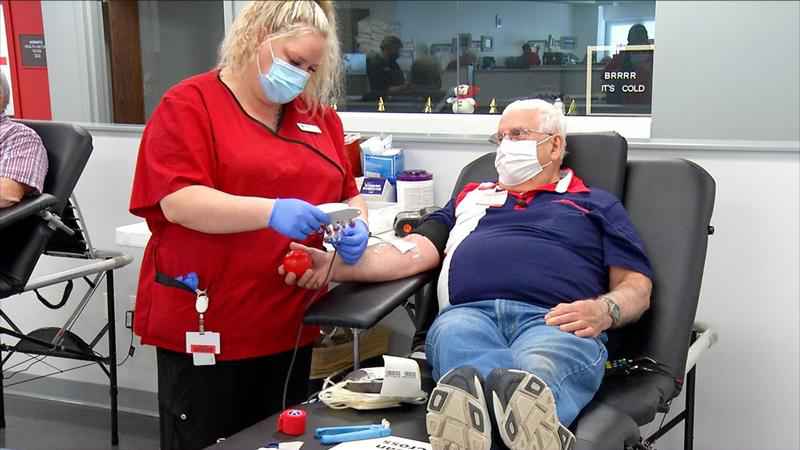‘It truly is a crisis’: Red Cross desperate for blood donations amid nationwide shortage
[anvplayer video=”5082870″ station=”998122″]
The American Red Cross says it is facing its worst blood shortage in more than a decade while COVID-19 continues to surge across the country.
The Red Cross declared its first-ever blood crisis on Tuesday, saying all types of blood are needed, especially types O-positive and O-negative.
"I’ve been with the Red Cross for 20 years and I’ve never seen anything like this. It truly is a crisis," said Carrie Carlson-Guest, regional communications director for the American Red Cross in Minnesota and the Dakotas. "We have less than a one-day supply of blood on hand. Some days, much less than that. Typically, we like to keep five days on the shelves."
The Red Cross says it’s dealing with a 10% drop in the number of people donating blood since the pandemic started, and has particularly experienced low donor turnout since the delta variant began spreading in August.
"Also, because of COVID, schools and businesses that usually open their doors to let us collect blood, many of them are closed," Carlson-Guest said.

A patient gives blood Tuesday, Jan. 11, 2022, at the Red Cross Mary Coultrap Johnson Blood and Platelet Donation Center in St. Paul.[KSTP]
The American Red Cross supplies 40% of the nation’s blood.
The organization said it has had to limit blood shipments to hospitals in the last few weeks, noting that some hospitals are receiving less than a quarter of the blood products they request, threatening patient care.
"They really have to make some critical decisions right now," Carlson-Guest said. "I think everyone has a loved one who’s had cancer, been in a car accident, who may have complications during birth. And you just think, what if blood wasn’t available for your loved one when they needed it most?"
Carlson-Guest said ongoing staffing shortages at their donation centers are also complicating the ability to collect blood, as they struggle to recruit new phlebotomists while continuing to deal with staff members getting sick or having to quarantine.
She acknowledged Minnesotans may experience a delay in being able to donate.
"We really ask people to be patient. Look at a couple weeks out, look at next month. The need for blood is constant and we will still need that blood then," Carlson-Guest said.
The newly opened Red Cross Mary Coultrap Johnson Blood and Platelet Donation Center in St. Paul will help expand capacity.
The $2 million renovation project created a new 8,000 square foot blood donation space with 12 whole blood donor beds, 15 apheresis donor beds for platelet and plasma donations, two leukapheresis donor beds for white blood cell donations and 10 health history rooms.
It is now the third-largest Red Cross manufacturing and distribution center for blood products in the country and will serve as a regional training hub for volunteers and staff.
Carlson-Guest hopes to recruit more volunteers during this blood crisis to perform tasks such as checking donors in and assisting them after they donate blood, to free up phlebotomists for drawing blood.
Phil Rosenberger of Inver Grove Heights donated blood at the new donation center Tuesday, after seeing a 5 EYEWITNESS News report about the blood shortage two weeks ago.
"It’s just the fact that you can do something to help somebody else, you know what I mean?" Rosenberger said. "It’s about time. It’s been a while since I gave blood, so today is the day."
The Red Cross said all blood types are needed right now, especially types O-positive and O-negative, as well as platelet donations, to help reverse the national blood crisis.
"If you can take an hour to roll up a sleeve, that hour may mean a lifetime to someone else," Carlson-Guest said.
You can make an appointment to give blood or platelets by using the Red Cross Blood Donor app, visiting the Red Cross website or calling 1-800-733-2767. Additionally, the Red Cross says blood drive volunteers are needed to support collections across the U.S. Anyone can apply to volunteer online.
Memorial Blood Centers, which has operations in Minnesota and Wisconsin, is also struggling to find donors.
The nonprofit said it often sees a decline in donations during the winter months due to holiday travel, snowstorms and cold and flu season but noted the decrease this year is even greater because of the highly contagious omicron variant of COVID-19.
“Our highest priority is the health and safety of our donors and the patients who receive their blood," MBC Senior Executive Director Kathy Geist said. "Of course, we want donors to stay home if they’re sick or if the weather prevents safe travel. We’re just desperately in need of other eligible donors to step up and close the loop on saving lives close to home."
MBC noted only 38% of people are eligible to give blood. Other ways to help include hosting a blood drive, volunteering at local events and donating money. To schedule an appointment or learn how you can help, call 1-888-448-3253 or visit MBC’s website.